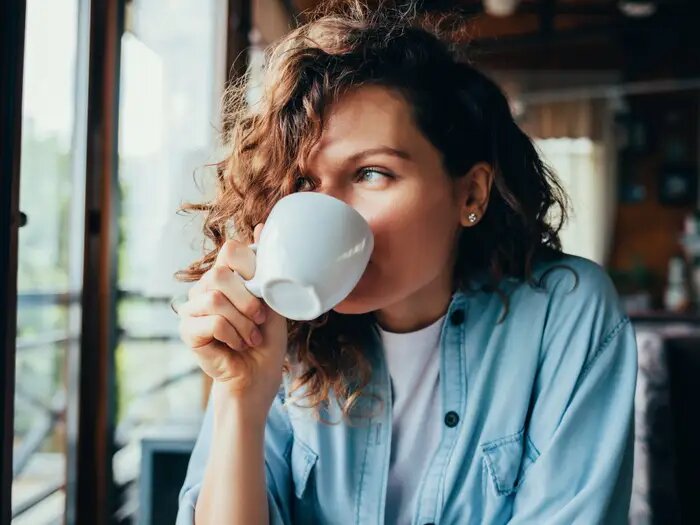Hey there! Have you ever thought about using black tea for your hair? Today, we’ll check this idea. Black tea, the same kind people enjoy drinking, might be good for your hair. Recently, it has gained attention for its potential benefits for hair health. But does black tea truly live up to its reputation as a hair care medicine?
We will explore the interesting question: Is black tea good for hair? We will find the benefits and potential side effects of black tea on hair and provide an expert view backed by research and personal experiences.
But there’s another side you should know. We’ll also look at the potential negatives. It’s smart to know the facts before deciding what’s best for your hair. So, if you’re curious about whether black tea could be a secret to better hair, keep reading.
Let’s figure out if black tea could be best for your hair and what you should consider before trying it.
Is Black Tea Good for Hair?

When it comes to hair care, black tea might not be the first thing that comes to mind. However, it has many benefits that can contribute to healthier, shinier, and stronger hair. To use black tea for hair care, you can brew a strong cup of it, allow it to cool, and then apply it to your scalp and hair as a rinse after shampooing. Gently massaging the tea into your scalp can further stimulate circulation. Leave it on for a few minutes before rinsing with water. Black tea is a rich and natural source of caffeine, so it strengthens our hair follicles.
1. Improve the Hair Growth

Caffeine can extend the growth phase of hair and make a longer end of the hair. Black tea contains caffeine, which can stimulate hair follicles and promote hair growth. Caffeine helps increase blood circulation to the scalp, giving vital nutrients and oxygen to the hair roots. This gives healthier and stronger hair growth. Regular use of black tea rinses can contribute to fuller and thicker hair over time.
2. Reduces Hair Shedding

The caffeine in black tea also helps reduce the protection by inhibiting the effects of dihydrotestosterone (DHT), a hormone linked to hair loss. By blocking DHT, black tea can contribute to maintaining a fuller head of hair. The compounds in black tea, such as catechins and antioxidants, help to strengthen hair strands and prevent excessive hair loss. These compounds secure the hair’s structure and reduce breakage of hair. Using black tea rinses in your hair care routine can help maintain the volume of your hair and minimize shedding.
3. Adds Shine

Rinsing your hair with black tea can add natural shine and luster. The tannins in black tea tighten hair cuticles, reflecting more light and resulting in glossy locks. Black tea’s rich content of tannins adds glow to your hair. Tannins smooth down the hair’s outer layer, creating a reflective surface that increases the overall appearance of your hair. Regular use of black tea rinses can give your hair a glossy look, making it look healthier and more bright.
4. Darkens Hair

Black tea can naturally darken hair color, making it an excellent option for those looking to cover gray strands or their color without resorting to chemical color dyes for hair. Black tea serves as an original hair darkener due to its rich content of tannins. These compounds add detail and darkness to your hair color, making it an excellent choice for those looking to improve their hair’s color without using harsh chemicals. Regular rinses with cooled black tea can gradually darken your hair, giving it a vibrant appearance.
5. Strengthens Hair Strands

Rich in antioxidants, black tea helps reduce oxidative stress and damage caused by free dust particles. This can lead to stronger and more strong hair strands by using Art Naturals Black Tea Hair Mask. The caffeine present in black tea helps stimulate hair follicles and promotes hair growth. It strengthens hair strands by improving blood circulation to the scalp, nourishing the hair roots, and preventing breakage. Stronger hair strands lead to reduced hair fall and a healthier look and feel.
6. Solve Scalp Irritation

The natural properties of black tea can solve an irritated scalp, reducing itchiness and dryness. It can also aid in controlling dandruff and maintaining a healthy scalp environment. Black tea’s anti-inflammatory properties provide relief from scalp itching.
It contains antioxidants that help reduce redness and inflammation caused by conditions like dandruff or dry scalp. Applying black tea rinses or using hair products containing black tea can calm the scalp, maintaining its health and ensuring a comfortable experience.
7. Improves Hair Texture

The conditioning properties of black tea can improve hair texture, making it feel smoother and silkier to the vibe. Black tea contains simple compounds that can help increase hair texture.
It contains tannins that bind to the hair strands, giving them a shinier look without using the hair color. These tannins can also create a protective layer on the hair, preventing damage from environmental factors and styling products.
8. Addresses Hair Fall

The caffeine content in black tea can help minimize hair fall by strengthening hair roots and reducing breakage. The caffeine present in black tea can stimulate hair follicles and promote hair growth, effectively reducing hair fall. Caffeine helps extend the growth phase of hair, giving it more time to grow strong and resist falling out. This can lead to thicker hair over time. We have to take care not to use it in large quantities because of caffeine.
9. Maximize Hair Health

With the blend of vitamins and minerals, such as Vitamin B, potassium, and magnesium, black tea nourishes hair from the roots, promoting overall hair health. Black tea is rich in antioxidants that help fight oxidative stress and free radicals, which can damage hair cells and lead to hair problems. Regular use of black tea masks on the hair and scalp can nourish hair follicles, resulting in healthier, more resilient hair.
10. Minimizes Split Ends

Regular use of black tea on your hair can help minimize split ends by providing the necessary hydration and nourishment. The natural properties of black tea can help in reducing split ends. The tannins and caffeine in black tea help strengthen the hair shaft, making it less prone to splitting. By preventing split ends, hair can grow longer and maintain a well-groomed look.
Possible Side Effects of Black Tea on Hair

The caffeine side effects on hair could potentially have a drying effect on the scalp and hair. This might be more clear if black tea is used excessively or if the hair is naturally dry. Black tea can help reduce hair dryness due to its natural components. The caffeine in black tea helps stimulate hair follicles and gives healthier hair growth. It contains antioxidants that moisturize the scalp and hair, reducing dryness and promoting shine without using chemical shampoos. The tannins in black tea have a conditioning effect, locking in moisture and preventing excessive dryness. However, using black tea excessively might lead to over-drying.
2. Scalp Sensitivity
Another side effect of black tea on hair is that Some individuals may be sensitive to the tannins and caffeine present in black tea. This could lead to scalp irritation or discomfort. For those with a sensitive scalp, black tea can offer relief. Its anti-inflammatory properties can help soothe irritation and reduce redness.
The constructing properties of black tea help balance the scalp’s oil production, preventing both excess oiliness and dryness that can cause sensitivity. The caffeine content can stimulate blood circulation and help in nutrient delivery to the hair follicles. Yet, individuals with highly sensitive skin might want to perform a patch test to check the side effects for no terrible reactions.
3. Color Depositing
Black tea has a dark color, and using it on light-colored hair might result in some color downfall, giving the hair a temporary darker color. Using black tea on hair can result in a fine color-down effect. The tannins in tea attach to hair strands, creating a temporary tint that’s especially noticeable on light-colored hair. This natural color can increase the shine of your locks. However, the power of the color change might vary depending on your hair’s quality, and the original shade is also a side effect of black tea on hair. Regular application is needed to maintain the effect.
4. Allergic Reactions
While rare, some people might be allergic to certain compounds in black tea. If you experience any unusual reactions like itching, redness, or swelling, discontinue use immediately. While black tea is generally safe for most people, there are some side effects of black tea on hair, leading to allergic reactions that can occur. So, do a patch test before applying tea to your hair to check for any unfavorable reactions. If you notice signs of an allergy, discontinue use immediately. Always consult a dermatologist or allergist if you have concerns or a history of skin allergies before using black tea on your hair.
5. Staining
When using black tea on your hair, staining can occur due to its rich color. The natural pigments in black tea conditioner can impart a temporary tint to your hair, improving its color. This staining effect is fine and can be a great way to add detail to your hair color without using chemicals. However, the strength of the stain will depend on your hair’s porosity and existing color. Remember, the staining will gradually fade with each wash, allowing you to experiment with different shades.
6. Caffeine Sensitivity
Black tea contains caffeine, which can affect individuals differently. Some people might experience sensitivity to caffeine when applied topically on the scalp. Caffeine can stimulate blood flow, potentially promoting hair growth. However, those with caffeine care might encounter tingling sensations or mild discomfort. It’s advisable to perform a patch test before applying black tea all over your scalp to check for any harmful reactions. If sensitivity occurs, you can reduce the contact time of applying it. Always prioritize your comfort and well-being when using black tea for hair care.
Conclusion
As we’ve seen, Black tea offers a range of benefits and potential side effects of black tea on hair care. Its natural compounds can improve hair shine, reduce shedding, and temporarily darken hair.
The caffeine content may fasten hair growth, but those sensitive to caffeine might experience discomfort. Staining can occur due to black tea’s color pigments, which lead to bad effects of black tea on hair. To make an informed decision, consider your hair type, choices, and potential products. If you want to try using black tea for your hair, go ahead, but start small.
Maybe try it once a week and see how your hair reacts. Conduct a patch test before extensive use and follow the application method to your needs. While black tea can be a valuable addition to your hair care routine, understanding the side effects of black tea on hair will help you achieve the desired results.
We hope that you have got the answer.
Frequently Asked Questions
Can I Use Any Black Tea for My Hair?
Absolutely. You can use various types of black tea, such as Assam, Darjeeling, or Earl Grey, for your hair care routine. The benefits largely come from the caffeine content, so feel free to choose your favorite black tea blend.
Will Black Tea Stain My Hair?
While black tea may darken your hair slightly, it’s unlikely to cause significant staining. However, if you’re concerned, you can perform a patch test before applying it to your entire head.





